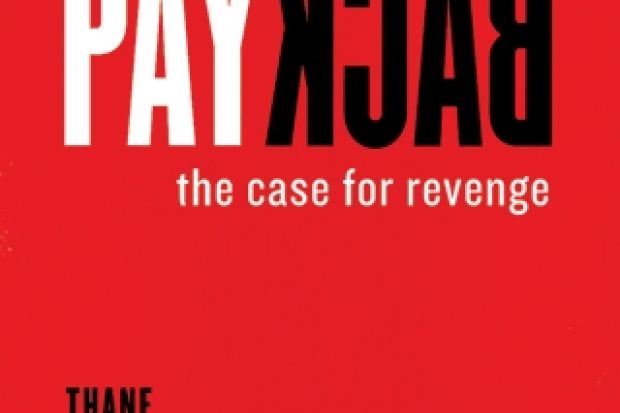For the heinous crime of “killing” my paper dolls (he cut them up), I gave my brother a black eye. I waited out of sight on the veranda and, as he appeared, I sloshed him. The fact that he had been sent to his room was insufficiently retributive, so I sought revenge. I got it - and, thus comforted, hardly cared that I was banished room-wards, too. I was 6.
We are told, regularly, that seeking revenge for wrongs done to us is something to grow out of, or that it is uncivilised, and so we must reject the impetus to seek personal revenge, and must feel ashamed of such “emotional” and unreasoned reactions. Therefore, revenge is seldom discussed with seriousness when looking at various formats for the delivery of justice (except as a historical phenomenon, showing either how far we have progressed or threatening retrogression). But it does need to be examined, as Thane Rosenbaum shows in this wide-ranging consideration of revenge as a cultural phenomenon. He specifically targets the comfortable fiction, relied on by so many experts and politicians, that civilised adults can and should rise above such emotions.
He draws on many disciplines to contextualise the reasons that led to my feeling “comforted” by my revenge, as he argues for the need to rehabilitate revenge not just in interpersonal relationships but also in the legal process. The result is a readably opinionated and thought- provoking book. I do not mean that it is perfect or that I agree with all of Rosenbaum’s conclusions. There are some irritations, such as the tendency to elide retribution and revenge instead of appreciating that they are different terms; recognition of this difference could have strengthened the book’s themes. This is particularly the case in relation to Rosenbaum’s failure to appreciate the way in which, historically, Western criminal justice systems have sought to manage the impetus to vengeance in the interests of social order.
Glossing over historical nuance may have been a deliberate choice in an attempt to make Payback more accessible. The result, however, is that it distorts the historical record on past levels of citizen involvement and consequent satisfaction with the punishment process. Here, I was also surprised at the lack of discussion of the historic role of shame and shaming punishments and their importance in balancing revenge and social order. Yet despite (or because of?) these criticisms, Payback has made me want to engage with its arguments; I have been tempted to write not so much a review but a response, arguing, for instance, that Rosenbaum should have looked at Cretan and Russian society (engaging with the work of Aris Tsantiropoulos and Natalia Pushkareva, respectively, on shame) or even Shakespeare’s Measure for Measure. That temptation stems in part from the fact that the book is constructed as essay-style chapters around a central theme, thus creating a “conversation” or argumentative discourse with the reader. One of its strengths is its multidisciplinarity, drawing ideas from life, science, literature and history to reflect on recent crimes that have caused real moral dilemmas and perceived failures in justice delivery. It will be recommended reading on quite a few book lists because of this, rather like Helena Kennedy’s landmark 1993 work Eve Was Framed: Women and British Justice.
Importantly, Rosenbaum puts his finger on a significant point: that a key factor in the recent revenge incidents he discusses is the current damaging disengagement between the criminal justice formalities of trial and punishment and the popular sense of what constitutes justice for those convicted of heinous offences. It must entail punishment that is satisfyingly retributive but not vengeful (balanced, in other words) and does indeed require a greater citizen involvement in trial outcomes. In sum, Payback is worth reading, even if only to disagree with it.
Payback: The Case for Revenge
By Thane Rosenbaum
University of Chicago Press, 328pp, £18.00
ISBN 9780226726618 and 6043692 (e-book)
Published 6 May 2013
Register to continue
Why register?
- Registration is free and only takes a moment
- Once registered, you can read 3 articles a month
- Sign up for our newsletter
Subscribe
Or subscribe for unlimited access to:
- Unlimited access to news, views, insights & reviews
- Digital editions
- Digital access to THE’s university and college rankings analysis
Already registered or a current subscriber?




